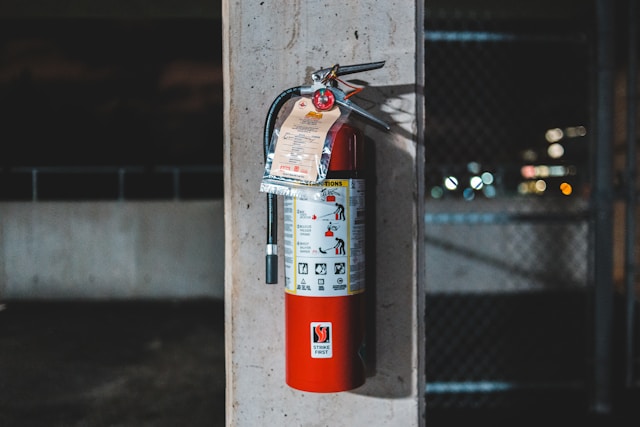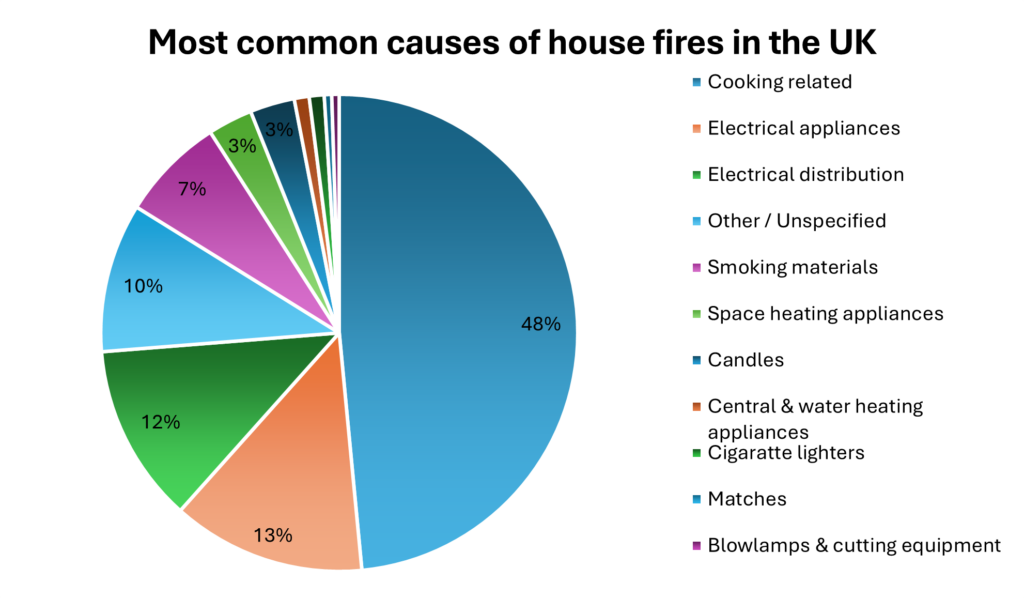Fire claims, what to expect?

By Oscar Camilleri, Claims Handler
Whilst infrequent, fires tend to be one of the most destructive and expensive incidents that can affect a building. UK statistics show that the average cost of a fire claim in a private residence is circa £25,000, increasing to £65,000 in commercial buildings & blocks of flats.
There can be various causes for a fire; with the most common being cooking related, followed shortly by faulty appliances and electrical wiring.

Source: Intelligent Security and Fire
What to do in the event of a fire?
- – Activate the fire alarm, ensure that you are safe and dial emergency services.
- – If the fire is manageable, ensuring your safety and that of others, you can attempt to extinguish it.
- – Evacuate the premises as soon as possible and stay at a safe distance. Even if you did manage to extinguish the fire, do not re-enter the building until the fire services confirm that it is safe to do so.
- – Inform your insurance company as soon as possible.
Further information which will assist you and your insurers in the event of a claim:
- – How many units (fire engines) attended the premises?
- – Request a copy of the fire services report or the incident number.
- – What was the cause of the fire?
- – If the fire was from a faulty electrical appliance (washing machine, dryer, phone charger, electric bike, etc). Do not dispose of the item until the insurers had a chance to inspect this.
- – The fire services would usually organise for the electricity, gas & water supplies to be disconnected. However, if not, please ensure that you contact the relevant suppliers to organise this.
- – Keep hold of any invoices for emergency repairs.
Depending on the extent of damage various specialists might be instructed by the insurers to deal with your claim. These can range from loss adjusters, fire restoration specialists, and forensics and their roles are explained below:
Loss adjusters
Loss adjusters are claim specialists usually from a surveying background. They would usually attend the scene of the incident to assess the damage and then assist you with the handling of the claim, reinstatement, instruct contractors and other specialists, organise alternative accommodation, etc.
Fire restoration specialists (disaster restoration)
These are contractors who specialize in dealing with the aftermath of highly destructive incidents. Typically fires, floods, oil & chemical spills, etc. They would usually be tasked with organising the strip-out of the damaged areas, install drying equipment, clean and deodorise smoke damaged areas, etc.
Forensics
These are persons who are specially trained in identifying the starting point of a fire, the potential cause, whether accelerants were used, etc. Insurers might instruct a forensics specialist to carry out an inspection; if the cause of the fire cannot be easily established, there is suspicion of arson, or the fire was caused by an electrical appliance and there is the potential to seek redress from the manufacturer.
Tips to minimise the risk of fire incidents!
- – Do not leave any cooking pots & pans unattended, especially if deep frying.
- – Where possible refrain from using candles, tea lights or naked flames. If using, ensure that they are put in the appropriate holders, kept away from objects which can easily catch fire and are not left unattended.
- – Ensure that any fire sensors & alarms are tested on a regular basis.
- – If there is fire extinguishing equipment on the premises. Do ensure that these are serviced regularly and inform the tenants/employees on how to use the equipment safely.
- – Ensure that any fire doors are kept closed unless they are on an automatic closing mechanism, in which case ensure that the mechanism is in good working order.
- – Ensure that any fire exits, and escape routes are clearly marked and free from obstructions.
- – If there is a fire escape plan, ensure that it is displayed in prominent locations in the building.
- – Ensure that any rubbish and other combustible materials are disposed in the designated bin areas, are not allowed to pile-up, and where possible restrict access to unauthorised persons.
- – For commercial buildings and blocks of flats it is advisable to periodically conduct a fire risk assessment.
Albanwise Insurance Services are proud to have a very knowledgeable team with years of experience. Should you have any queries whether it is about policy coverage, claims, risk management or you are simply after some advice, contact us here or send us an email info@albanwiseinsurance.co.uk – and we will be glad to assist and offer our help.



